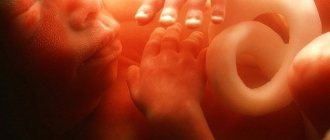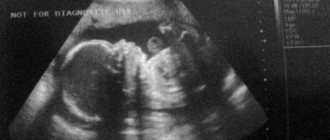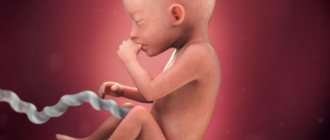With the onset of the second trimester of pregnancy, almost the “golden time” begins for the expectant mother: toxicosis is most likely a thing of the past, the tummy has become somewhat rounded, but not yet so much as to add clumsiness and difficulties to the woman. The second trimester of pregnancy, starting from the 13th week, becomes the most fertile period for the expectant mother: now you can walk in the fresh air to your heart's content, visit the pool or yoga classes, enjoy theater performances and reading books, without suffering from headaches and a constant feeling of nausea.
With each week, pregnancy becomes noticeable to others: a woman’s figure becomes rounder, her breasts increase in size. Experts advise you to slowly think about a bandage, which is recommended to start wearing from about the 20th week of pregnancy in order to avoid stretch marks and to eliminate the threat of miscarriage. At the same time, you can slowly begin to prepare your breasts for feeding by daily rubbing the mammary glands with a terry towel and taking air baths.
The second trimester of pregnancy also marks one of the main periods of the baby’s intrauterine life: by the 16th week, the formation of the baby’s internal organs and the formation of the placenta are completed. So, from now on, the function of supplying oxygen and nutrients, as well as the responsibility to protect the child from the influence of many harmful substances and the penetration of infections, falls on the placenta.
Features and dangers of the second trimester of pregnancy
In conventional obstetric management of pregnancy, the 2nd trimester begins at 13 and ends at 26 weeks. At this time, the fetus grows quite slowly and gradually. In the middle of pregnancy, which occurs at 21 weeks, the fetus can be compared in size to an average apple. Subsequently, the unborn child will begin to actively build up subcutaneous fat and gain weight.
As a rule, in the middle of the term, the size of the abdomen begins to noticeably increase in volume. The changes concern not only the increase in the waist of the expectant mother, but the bone structure of the pelvis. The expansion of the pelvic bones gradually begins, as one of the stages of preparation for labor. Important features and symptoms of the 2nd trimester of pregnancy include the first sensations of the baby’s movements, which occur between 18 and 20 weeks. This standard indicator is considered conditional, since much depends on the size and activity of the fetus, the sensitivity of the mother’s nervous system, and the order of pregnancy. During the second and subsequent pregnancies, the first movements may be felt starting from the 16th week.
All expectant mothers are interested in the question of why the 2nd trimester of pregnancy is dangerous. In the first trimester, the threat of miscarriage occurs in the very first weeks; it can arise due to problems with the movement of the fertilized egg through the tube and implantation into the uterine endometrium. Having successfully passed this period, and protecting herself from increased emotional and physical stress, a woman can calm down. The next dangerous stage occurs from 18 to 22 weeks. It is during this period that there is a risk of so-called “late miscarriage”.
The threat arises for the following reasons:
- ICI (isthmic-cervical insufficiency). A dangerous condition of the uterine muscles, in which the muscles cannot support the weight of the growing fetus and relax. As a result, pathological premature dilatation of the cervix occurs, which can lead to the threat of early labor. It should be noted that such a disorder is extremely rare and is most often caused by individual developmental defects and aspects of a woman’s health. The cause of the development of this pathology is most often problems of hormonal balance (lack of progesterone, excess of androgens), trauma to the pelvic organs, complications of a postoperative nature (dilation of the cervix), in case of polyhydramnios or multiple pregnancies. The main problem of ICI is the fact that it occurs practically without symptoms; only a doctor can suspect it during examination, and confirm it with the help of a special study - hysterosalpingography. It is possible to prevent preterm labor with ICI by placing sutures on the cervix or using an obstetric device to support the uterus (pressarium).
- Incorrect location of the placenta. This type of pathology occurs in cases where the placenta is located too close to the os of the uterus. Depending on the type of disorder, there are complete, partial, lower central, lateral, posterior, anterior, and marginal placenta previa. The cause of presentation is various factors:
- changes in the uterine mucosa caused by inflammatory processes or surgical interventions (uterine factor);
- enzyme deficiency caused by previous salpingitis or hormonal imbalance (fetal factor);
- underdevelopment of the female genital organs (congenital factor);
- tumor neoplasms, abortions, inflammatory diseases of the endometrium, cervix, ovaries. Placenta previa is detected by a doctor when listening to the fetus; symptoms of this pathology include spotting (in extreme cases - bleeding), high position of the uterus. For an accurate diagnosis, it is enough to do an ultrasound in the 2nd trimester of pregnancy (planned or urgent according to indications). The danger of presentation lies in the threat of intrauterine fetal death or the risk of premature birth. Treatment, usually medication, is developed individually.
Need for vitamins and microelements
For the normal course of the second trimester of pregnancy, it is necessary to give the body the entire complex of useful vitamins, nutritional components, macro- and microelements.
The need for vitamins and minerals increases by 30-40%. A lack of vital substances in a woman’s body can lead to serious disorders - fetal pathologies and even miscarriage.
The main complications caused by a deficiency of vitamins and minerals during pregnancy:
- Slowing growth and development.
- Failures in the process of formation of organs and systems (nervous, endocrine, digestive).
There are established norms for the consumption of these substances per day (according to the recommendations of WHO and RosPotrebNadzor).
Vitamins
| Tocopherol (E) | Normal – 17 mg
|
| Calciferol (D) | Normal – 12.5 mcg
|
| Retinol (A) | Normal - about 1000 mcg
|
| B vitamins | Thiamine (B1) Norm – 1.7
Riboflavin (B2) Normal – 2 mg
Niacin (B3/PP) Normal – 22 mg
Pantothenic acid (B5) Normal - about 6 mg
With a deficiency of B5, the risks of damage to the skin and mucous membranes primarily increase. Pyridoxine (B6) Normal - about 2.3 mg
Folic acid (B9) It is recommended to take it during the initial period of pregnancy planning (before conception). Pharmacy medications in strictly designated dosages must be taken by a woman throughout the entire period of gestation. The daily norm is about 600 mcg. The norm can be adjusted by a doctor.
|
| Ascorbic acid (C) | Normal – at least 100 mg
|
Microelements
| Iron | The need for microelements increases sharply, starting from the beginning of the second trimester of pregnancy. A deficiency of the element leads to anemia in the mother and child and the development of numerous complications. The daily norm is from 33 to 60 mg. The dose is determined individually by the doctor observing the woman. In some cases it can be increased to 120 mg. |
| Zinc | The norm per day is 15 mg. Deficiency leads to fetal malformations and an increased likelihood of premature birth. |
| Copper | Normal – 1.1 mg Promotes:
With a deficiency, the risks of developing the cardiovascular and skeletal systems and connective tissue increase. |
| Selenium | Norm – not less than 65 mcg Provides:
Selenium deficiency during pregnancy causes serious multiple pathologies of the joints, spinal column, upper and lower extremities, heart defects, etc. |
| Manganese | Daily norm – 2.2 mg Necessary for the formation of bones and connective tissue, ensuring the metabolism of many substances:
In case of deficiency, a number of disorders are diagnosed:
|
| Calcium | Normal - about 1300 mg The exact dosage is determined by the doctor and can range from 1500 to 2000 mg per day. The deficiency causes:
|
| Iodine | Normal - about 220 mcg Provides:
Iodine deficiency is primarily dangerous due to the formation of mental disability and developmental delays. |
| Magnesium | Normal – about 450 mg Ensures the normal flow of a number of important processes, these are:
Deficiency during pregnancy increases the risk of developing heart and vascular diseases and can lead to arterial hypertension. |
| Phosphorus | Norm – not less than 1000 mg Provides the following processes:
Deficiency leads to the formation of rickets, anemia, fragility of bones and teeth. |
Additional vital components
| Carotenoid lutein | Ensuring the normal functioning of the retina. The daily norm is 5 mg. |
| Bioflavonoid Rutoside (rutin) | Strengthening the walls of blood vessels. Prevention of edema. Prevention of varicose veins. The norm per day is about 30 mg. |
Deficiency of vitamins and microelements (three or more at a time) is found in almost 80% of pregnant women (information provided by the Research Institute of Nutrition of the Russian Academy of Medical Sciences).
When taking special vitamin supplements, dietary supplements and complexes for pregnant women, you should carefully read the instructions and use the drugs in precisely indicated dosages. You cannot adjust doses at your own discretion and violate the rules for taking medications! Neglecting your doctor's recommendations can lead to an overdose of medications and cause various complications, including severe allergic reactions.
Is it possible to replenish the deficiency of vitamins and microelements with food?
A balanced menu allows you to replenish your body with vital substances every day. But this is often not enough. Taking special medications prescribed by a doctor is the only correct solution for confirmed deficiency of minerals and vitamins.
Normal and anxiety states during pregnancy
The state of health of the expectant mother in the second trimester of pregnancy is usually good and calm. Toxicosis of the first months has already ended by this time, the body has fully adapted to the new state, and the emotional background has leveled out. However, some problems still occur. Some of them fit into accepted standards, others require attention from specialists, additional research and correction.
The most common physiological factors that may bother a pregnant woman in the 2nd trimester include:
- Toxicosis of the 2nd trimester of pregnancy is one of the pathological conditions and is considered a threat to the normal development of the fetus. As a rule, toxicosis is accompanied by a general deterioration in health, weakness, and swelling, which threatens the development of gestosis.
- Edema in the 2nd trimester of pregnancy is a common phenomenon; in non-critical conditions, it is within normal limits. The appearance of slight swelling of the legs (legs and feet) at the end of the day is caused by the growing uterus, which puts pressure on the vessels of the internal organs and the urinary tract. Swelling of the face and body may indicate disturbances in the functioning of the cardiovascular system and in such cases, consultation with a doctor is necessary. What to do with swelling during the 2nd trimester of pregnancy? To improve fluid separation, experts recommend drinking herbal infusions, periodically resting the body, raising your legs above the level of your body, and doing light, simple exercises. Severe swelling in combination with other symptoms and poor health is a serious reason to consult a doctor.
- Tone in the 2nd trimester of pregnancy is part of the norm, if its manifestations are not critical and do not last long. Symptoms of uterine tone during the 2nd trimester of pregnancy are characteristic tension of the abdominal muscles, which is manifested by a feeling of hardness and petrification of the uterus. Short-term attacks are explained by hormonal changes that continue to occur in the body. A dangerous sign is prolonged or very frequent manifestations of uterine tone during the 2nd trimester of pregnancy. In this case, there is a need for examination to eliminate the threat of developing hypertonicity.
- Hypertonicity of the uterus during the 2nd trimester of pregnancy is characterized by a feeling of heaviness in the lower abdomen, strong pressure on the inguinal and pubic area, and pain in the lower pelvic area. If your lower back hurts in the 2nd trimester of pregnancy, this may also be one of the signs of hypertension. The danger of hypertonicity lies in the risk of developing oxygen starvation of the fetus (due to poor circulation in the placenta) and the threat of premature birth (due to increased stress on the muscles and cervix). Therefore, it is important and necessary to pay attention to frequent and prolonged pain during the 2nd trimester of pregnancy. The cause of hypertonicity is most often emotional shocks, complications after suffering an acute respiratory infection during the 2nd trimester of pregnancy, hormonal disorders, and inflammatory processes in the pelvic organs. To identify the causes and eliminate the threats, it is important to consult a doctor in a timely manner and undergo an examination.
- Abdominal pain during the 2nd trimester of pregnancy can be completely safe and understandable. Often in women during the 2nd trimester of pregnancy, the stomach hurts on the right side; this may be due to intestinal compression. The enlarging uterus, to one degree or another, affects organs located in close proximity in the abdominal cavity and pelvis. As a rule, if the stomach hurts on the right side during the 2nd trimester of pregnancy, then this symptom is also accompanied by constipation. When the stomach hurts on the lower right side during the 2nd trimester of pregnancy, the cause may be hidden in the load on the round ligament that supports the body of the uterus. If the stomach is pulled during the 2nd trimester of pregnancy, then this type of pain syndrome is explained by stretching of the smooth muscles of the uterus. In general, pain in the right and lower abdomen during pregnancy in the 2nd trimester is considered normal if it is not very intense and is not accompanied by other pathological symptoms.
- Headache in the 2nd trimester of pregnancy is caused by a number of reasons. The main reason is natural hormonal changes - increased levels of progesterone and estrogen, which affect vascular tone. In the background there will be changes in the functioning of the cardiovascular system and postural disorders caused by an enlarged abdomen. If you have a headache in the 2nd trimester of pregnancy, then you need to treat the headache with caution. Of the approved drugs, paracetamol and drugs based on it are considered the safest.
- Changes in blood pressure can also be caused by changes in a pregnant woman's hormonal balance. A slight decrease in blood pressure is considered normal, but if the pressure drops below 90/60 mm Hg. Art., it is worth contacting the gynecologist leading the pregnancy. With a strong decrease in blood pressure, there is a threat of oxygen starvation of the fetus (hypoxia), and the risk of developing placental insufficiency increases. What to do during pregnancy 2nd trimester of pregnancy? Hypotension during pregnancy is dangerous, so you should not endure the ailments associated with it. Experts advise resorting to non-medicinal methods of increasing blood pressure - eating more fruits and vegetables, drinking green tea, hibiscus, infusion of viburnum berries, taking tinctures of Eleutherococcus, rosea radiola, and zamanikha in limited quantities.
- Discharge in the 2nd trimester of pregnancy can vary significantly. Most often, women experience clear, watery discharge without color or odor during this period. They may have a slightly slimy consistency and a whitish tint. There should be no irritation or pain during the discharge. If there is blood in the discharge or it takes on an unpleasant bluish tint, you should immediately consult a doctor.
- Hemorrhoids during pregnancy in the 2nd trimester are common, but are not a normal condition. The occurrence of hemorrhoids can have many causes - poor circulation in the pelvis, increased load and pressure on blood vessels, heredity, stress, poor diet, frequent constipation. For the safe treatment of hemorrhoids, many pharmaceutical preparations are suitable for pregnant women - suppositories with propolis, heparin ointment, suppositories and Relief ointment.
- Iron deficiency anemia of pregnant women is a condition in which the level of red blood cells and hemoglobin in the blood is reduced. When hemoglobin decreases below the level of 110 g/l, there is a risk of developing gestosis, complications in the fetus, premature leakage of amniotic fluid, and weakness of labor. The hemoglobin level during pregnancy in the 2nd trimester should normally be 110-140 g/l. If this indicator decreases, you need to undergo drug therapy and develop a diet based on foods high in iron.
- Allergies during pregnancy in the 2nd trimester, like other health disorders, are caused by an increased load on the immune system of the expectant mother. Factors that increase the risk of developing allergic reactions are stress and emotional distress, the consequences of toxicosis in the first trimester, unhealthy unbalanced diet, frequent contact with chemicals (household chemicals, cosmetics), and environmental conditions. Treatment of allergies in the second trimester is broader than in the initial stage of pregnancy, since the placental barrier has already been formed and the fetus is protected from the effects of many drugs. When treating allergies, you can use antihistamines Diazolin, Pheniramine, Prednisolone. A special diet and vitamin complexes, enhanced with B vitamins and ascorbic acid, will help strengthen the immune system.
What is uterine hypertonicity?
Hypertonicity is the contraction of the uterus during pregnancy. This condition can occur at any time.
Signs:
- abdominal tension, it becomes “like a stone”;
- additional negative sensations – pain and heaviness in the lower back or back.
Of course, this condition often frightens a woman. Only a doctor can determine whether there is a threat of premature birth. The specialist conducts an examination, questions the patient, clarifying the nature of the tone, its duration, intensity and frequency. If required, an unscheduled ultrasound is prescribed.
Braxton-Hicks contractions in the second trimester
These are the so-called training contractions. The sensations during them are the same as with hypertonicity. But there is a cardinal difference - duration.
Features of training bouts:
- duration from several seconds to several minutes;
- quick cessation after changing body position or taking a shower;
- frequency - sometimes up to 10 times per day.
Before childbirth, such matchups can occur even more often. Thus, the body prepares for childbirth.
Diagnosis and research in the second trimester of pregnancy
Pregnancy management involves routine examinations, examinations and diagnostic procedures. Before each visit to the doctor, a woman undergoes a general urine test, which serves as a control test along with a routine examination and measurements. At 20-23 weeks, that is, in the middle of pregnancy, routine screening is prescribed, which includes laboratory and instrumental studies.
List of tests for the 2nd trimester of pregnancy:
- a general urine test allows you to identify the threat of developing preeclampsia (based on traces of protein), infection (based on bacteriuria), as well as timely detect other abnormalities;
- general blood test - assessment of the work and condition of internal organs and systems, hemoglobin level;
- ESR during pregnancy in the 2nd trimester shows the number of blood particles and makes it possible to estimate the rate of blood renewal; this indicator changes throughout pregnancy.
In addition to laboratory tests, an ultrasound scan is prescribed in the 2nd trimester of pregnancy. According to the approved obstetric plan, this occurs at 20-24 weeks. The study evaluates:
- fetal condition;
- consistency in its development;
- ratio of skeletal bones;
- interparietal dimensions of the head;
- amount of amniotic fluid;
- condition of the placenta;
- checking motor activity;
- umbilical cord location;
- determining the sex of the child.
Thanks to the second planned ultrasound, serious abnormalities in the development of the fetus and conditions that threaten the further successful course of pregnancy can be identified. This information helps to take timely measures to correct and eliminate possible risks.
How the fetus develops
At week 14, the fetal body length is about 7-8 cm, weight is about 20 grams. The lungs are actively developing throughout the trimester. The body begins to produce a special substance that prevents the lungs from collapsing/sticking together when exhaling (protective surfactant). At 26 weeks of pregnancy, the eyeballs are still covered by the eyelids, but are fully formed. The baby grows to 20-23 centimeters and weighs approximately 750 to 830 grams.
And already at 27 weeks the eyelids open. The child distinguishes between darkness and light penetrating through the wall of the mother’s abdomen. Its normal weight exceeds 1000 grams.
Features of the period:
- active development and formation of organs;
- the beginning of the work of the intestines, hematopoietic and urinary systems;
- the baby receives information from the outside (recognition of sounds, touch, first emotions).
The child has developed his own daily routine. There is time for play and sleep. The baby does not like to be in the same position. He stretches, knocks on the walls of his mother’s belly, plays with his legs and umbilical cord.
During the trimester, the tiny fetus transforms into a little person leading an active lifestyle. His face acquires characteristic features that will delight and touch his parents after birth. The brain is developing very actively. It is not yet the same as in a newborn or an adult, since the convolutions are in the stage of formation.
Cold
Colds during the 2nd trimester of pregnancy are a common occurrence, often caused by a decrease in the immunity of a pregnant woman. When the body's protective functions are reduced, acute respiratory infections and acute respiratory viral infections can cause a lot of trouble. The treatment of colds during pregnancy in the 2nd trimester must be approached carefully and comprehensively, not forgetting about caution in the selection of medications and therapeutic methods. Many medications for treating colds during pregnancy in the 2nd trimester are strictly prohibited.
How can you treat a cold during pregnancy in the 2nd trimester? Depending on the symptoms and nature of the disease, gentle pharmaceutical and folk remedies can be used to treat acute respiratory infections:
- Cough during pregnancy can have very unpleasant and dangerous consequences, so treatment and prevention should begin at its first manifestations. To treat cough, you can use herbal preparations and herbal medicine. It is useful to drink warm herbal teas (linden, chamomile, sage) with honey and lemon (in the absence of allergies); warm (but not hot) inhalations with medicinal plants and essential oils (tea tree, fir, mint, eucalyptus) are recommended. Compresses on the bronchial area will help speed up the removal of mucus (you can use a solution of dimexide in a ratio of 1:5 or cabbage leaf with honey). It is better not to take cough medicines without a doctor’s recommendation or choose herbal remedies - Mucaltin tablets, Bronchipret, licorice root syrups, marshmallow, sage.
- Runny nose. Pregnant women are not recommended to use vasoconstrictor medications for the common cold; it is better to use medications based on essential oils and sea water.
- Temperature. If a cold is accompanied by a fever, it should be brought down when the readings are above 37.5-37.7 degrees. You can reduce your temperature during the 2nd trimester of pregnancy with paracetamol-based drugs (Panadol). In extreme cases, when there is a high temperature or when paracetamol is ineffective, ibuprofen-based products (Nurofen) can be used.
How dangerous is a cold during pregnancy 2nd trimester? The danger of acute respiratory infections is that a strong cough causes increased muscle tension, including the abdominal and uterine muscles, which can lead to tone and hypertonicity. And these conditions are fraught with the threat of late miscarriage and premature birth. In addition, a cold during pregnancy in the 2nd trimester can have consequences in the form of disturbances in the development of the fetus, especially with a severe bacterial infection. It is better not to treat acute respiratory infections on your own, but to consult a doctor immediately.
Woman's feelings
As noted above, for a woman, as a rule, the second trimester is a time of serenity and small joys. Thus, hormonal storms, toxicosis, changes in the body, manifested by drowsiness and weakness, characteristic of the first trimester, are already behind us. And the problems caused by the weight of a growing belly are far ahead. Most often, during the period under review, a woman has already become accustomed to her position, enjoys and is proud of it. A rounded belly tells others about future happiness, and from the 16th to 20th week the baby constantly lets his mother know about himself with the first timid dots.
It is in the second trimester that the expectant mother will feel the first tremors of the baby
Confidence in the safety of pregnancy is given to the expectant mother by examinations completed at the end of the first trimester (screening and the most extensive list of tests and consultations for the entire pregnancy). And closer to the 20th week, during the second screening, she will definitely find out the sex of her baby.
At the same time, not every expectant mother feels “like a feather” in the second trimester. Closer to the beginning of the third period of pregnancy, unpleasant sensations may begin and gradually increase:
- pain in the back, in the pelvic area after prolonged standing, uncomfortable posture, etc.;
- periodic “false” contractions (irregular “petrification” of the abdomen) – they are absolutely normal and can be present as early as the 20th week;
- constipation, hemorrhoids - a consequence of compression of the intestines by the uterus, the relaxing effect of progesterone on peristalsis and blood vessels (the doctor will recommend mild laxatives allowed for pregnant women, remedies for hemorrhoids);
- difficulties with choosing a sleeping position, and, accordingly, insomnia (you can already choose a special pillow for pregnant women);
- frequent urge to empty the bladder is also a consequence of uterine pressure;
- heartburn, heaviness in the stomach after eating - a consequence of compression of the stomach by the uterus (more typical for the third trimester, but can also appear at the end of the second);
- physiological nasal congestion (the so-called rhinitis of pregnant women) - rinsing the nose with saline solution or sea water can partly help;
- spasms of the lower extremities (you should consult a doctor about prescribing calcium or magnesium supplements);
- swelling of the lower extremities is a problem, rather, in the later stages, however, slight swelling of the legs in the evening may appear already in the second trimester (cool baths, placing the legs above body level, and using decongestant herbal teas allowed for pregnant women will help);
- the appearance of the first stretch marks on the chest, abdomen, hips (from the beginning of the trimester you should think about their prevention - moisturizing the skin with creams, oils, etc.);
- “dry” eye syndrome – a feeling of “sand in the eyes” due to insufficient moisture (the doctor will prescribe moisturizing eye drops).
Angina
Sore throat in the 2nd trimester of pregnancy carries a high risk for the unborn baby. This is due to the fact that sore throat in most cases is infectious in nature. Migration of purulent discharge can cause inflammation of other internal organs, intoxication of the body and penetration of infection through the placenta into the uterine cavity. If your throat begins to hurt during the 2nd trimester of pregnancy, treatment should be started immediately and comprehensively to avoid possible consequences and complications.
Sore throat during pregnancy in the 2nd trimester can be treated with antibacterial aerosols and topical antibiotics. Gargling with medicinal plants, not hot inhalations, and plenty of warm drinks are recommended. Antibiotics are prescribed to pregnant women with great caution in cases where other methods do not produce a visible effect. Tetracycline antibiotics are strictly prohibited; if necessary, drugs based on penicillins and cephalosporins are used.
How to choose the right doctor
Pregnancy is associated with uncertainty and anxiety. To prevent panic from overshadowing the joyful anticipation, it is advisable to decide in advance on the choice of a doctor. You can look for reviews of relevant specialists on the city forum, you can consult a gynecologist who is managing the pregnancy, but it is best to find out the opinion of mothers you know who gave birth in the maternity hospital you need.
When choosing a doctor, it is advisable to take into account the following criteria:
- he must have the appropriate qualifications;
- must adhere to those methods of obstetric care that appeal to you;
- He is a practitioner and has encountered many situations during the birth process.
Having decided on a couple of candidates, it is advisable to meet with them and discuss your preferences and concerns in a personal conversation. During the consultation, the doctor will be able to assess the condition of the pregnant woman, express his opinion regarding obstetric care and his vision of possible cooperation. After such a conversation, the expectant mother will be able to intuitively and realistically decide on the choice of a specialist to whom she will entrust the most precious thing - her and her child’s health.
The 2nd trimester of pregnancy can be called the prime of pregnancy, because it is at this time that the expectant mother is full of strength and energy, and waiting does not yet bring significant inconvenience and anxiety.
ARVI and influenza
ARVI during the 2nd trimester of pregnancy with timely and adequate treatment can pass without consequences and complications. There are no reliable medical facts that ARVI during pregnancy in the 2nd trimester has a serious impact on the development of the fetus. Viral infections are more dangerous at the beginning and end of pregnancy. However, at the first symptoms of influenza during pregnancy in the 2nd trimester, it is necessary to begin comprehensive treatment aimed at suppressing the viral infection and strengthening the body’s protective functions.
Treatment of ARVI during pregnancy in the 2nd trimester should be carried out under the supervision of a doctor. The treatment package should include:
- antiviral drugs allowed during pregnancy in the 2nd trimester (Ocillococcinum, Anaferon, Aflubin, Ergoferon, Grippferon);
- means that strengthen the immune system (Beresh Plus drops, Limontar, Viferon suppositories);
- vitamins to maintain general tone and body resistance (Magne B6, Elevit pronatal).
ARVI is often accompanied by fever, so a woman is faced with the question of how to reduce her temperature during pregnancy in the 2nd trimester. As already mentioned, a temperature of up to 37.5 degrees during pregnancy in the 2nd trimester is considered safe; it does not need to be reduced. If the temperature rises, then it can be treated with Paracetamol, Ibuprofen (or drugs based on these substances). Among the folk remedies, vinegar rubs (a solution of table vinegar with water in a 1:1 ratio), warm tea with raspberry jam, and berry fruit drinks are recommended.
What consequences can ARVI have during pregnancy in the 2nd trimester? With timely and high-quality treatment of a viral infection, in most cases it is possible to avoid any complications, both for the expectant mother and the fetus. The threat arises with prolonged absence of treatment. In this case, fetoplacental insufficiency, oxygen starvation of the fetus, disturbances in the development of the nervous and endocrine systems and pathology in the formation of bone tissue in the unborn baby may develop.
Massage and hair coloring
Every woman should pay attention to herself, no matter what condition she is in. For example, sign up for a massage course.
This type of relaxation procedure perfectly relieves stress.
Before you sign up for a massage, you need to remember the following rules:
- The massage therapist can only work on the arms, neck, legs and shoulder girdle.
- The chiropractor should perform the procedure without pressure or force. Only soft and light movements are allowed.
- Before starting a massage session, you should definitely consult a doctor who is managing your pregnancy.
The question: is it possible to dye hair raises many questions?
Top tip: enjoy your position!
rumors and prejudices. If you approach this procedure correctly, then you don’t have to worry that hair coloring can somehow harm your unborn child.
Just choose a paint with a gentle composition. In addition, you can use natural dyes, such as basma or henna. They will not cause an allergic reaction in the expectant mother.
Read: How can you find out the sex of a child by the date of conception accurately and reliably?
Here are some more tips to help you get through this time better:
- Always take all the tests that are prescribed for you and visit your doctor. Don't forget about ultrasound. The second trimester of pregnancy involves visiting a specialist once every six months. In this case, a day before the visit, you must submit your urine for analysis. If you take responsibility for your health, you can promptly detect various diseases and pathologies and begin the necessary treatment on time.
- If even slight deviations from the norm are detected, the doctor will prescribe the necessary examinations and procedures. In no case should you engage in amateur activities and treat yourself. Such an irresponsible approach is fraught with health problems for both mother and baby.
The most important advice to all expectant mothers is simple: enjoy your interesting position, while receiving pleasure and joy from the upcoming motherhood. And in this case, the baby will certainly be born strong and healthy!
Watch the educational video:
03 Aug 2021 Yuki 503
Share this post
We recommend reading along with this article
- Every person should have a properly formulated diet...
- How to lose 5 or more kg per month after pregnancy and childbirth
- Feeding, sleeping, staying awake in the mode of a 2 month old baby
- Removal of fluid from the body: causes, symptoms, elimination of the disease
- Features of the menu for a baby at 10 months
- Fetal development at 29 weeks of gestation, main...
- Balanced diet and proper nutrition during breastfeeding
- Is it worth having a second child: arguments for and against
- What foods for pregnant women should be included in the diet in...
Thrush
The development of thrush during pregnancy in the 2nd trimester is due to several factors - changes in hormonal balance, decreased immune function, exacerbation of chronic diseases, endocrine disorders. Characteristic signs of candidiasis are copious curdled discharge, itching and irritation of the mucous membrane of the external genitalia. When the first symptoms of thrush appear in the 2nd trimester of pregnancy, treatment should be started immediately, as a fungal infection can cause a number of complications. These include infection of the ovum, premature leakage of amniotic fluid, and infection of the child during childbirth.
How to treat thrush during pregnancy 2nd trimester? It’s worth noting right away that taking tablets for thrush during pregnancy is not recommended. You can use topical medications in the form of vaginal suppositories, tablets and ointments. The most effective remedies are Pimafucin, Hexicon, Terzhinan, Clotrimazole. In addition to drug treatment, it is necessary to follow a diet excluding excessively sweet and spicy foods and baked goods. And consume more dairy products, vegetables and moderately sweet fruits.
Will my breasts continue to grow?
Yes, breasts grow at the same intensity in the second trimester due to an increase in the volume of the mammary glands and fat deposition. It is these changes that prepare the expectant mother for feeding her baby.
The skin on and around the nipples will become darker. A woman may notice the appearance of peculiar tubercles around her nipples. These are glands that secrete a special substance that prevents the skin of the nipples from drying out.
A yellowish liquid may also begin to be released - an intermediate form of milk (colostrum), which plays an important role in the first days of the baby’s life. Having a laxative property, colostrum helps the newborn get rid of meconium (original feces), which consists of epithelial cells, prenatal hair, mucus, amniotic fluid, bile and water digested in the prenatal period.
Herpes
A decrease in the functions of the immune system leads to the frequent appearance of symptoms of herpes on the lip during pregnancy in the 2nd trimester. The herpes virus, once in the blood, remains in the body in a latent state and manifests itself when the immune system is weakened and the body is under increased stress. The appearance of a cold on the lip during pregnancy in the 2nd trimester can be caused by hypothermia, emotional and physical fatigue.
Herpes during pregnancy in the 2nd trimester is treated with external medications based on acyclovir. In severe forms and acute symptoms, antiviral drugs are taken orally as prescribed by a doctor.
Drugs in the 2nd trimester of pregnancy
Medicines and pills during pregnancy in the 2nd trimester should be taken only after consultation with a gynecologist who is monitoring the woman’s condition. Among the most popular products are:
- Sedatives - during the 2nd trimester of pregnancy, many women experience strong emotional distress, so if necessary, they may be prescribed medications to relieve stress. Among the approved drugs, the leading ones are those based on medicinal plants (motherwort, lemon balm, valerian). These include Persen, Novo-Passit, Magne B6. On the recommendation of a doctor, you can take homeopathic remedies (Glycine).
- It is not advisable to take painkillers during the 2nd trimester of pregnancy. If necessary, you can take No-shpa and Ibuprofen in limited quantities and once. Analgesics should be completely avoided.
- During the 2nd trimester of pregnancy, it is better to take vitamins in their natural form, that is, eat more vegetables and fruits. If you need to support your immune system and exclude hypovitaminosis, you can use special vitamin and mineral complexes. To determine which vitamins to choose during pregnancy in the 2nd trimester, you need to consult your doctor. Studies have shown the effectiveness of drugs such as Elevit pronatal, Vitrum prenatal; for allergy sufferers, the best option is AlfaVit classic.
It should be understood that any medications during pregnancy are best taken after consultation and approval of a doctor.
Nutrition
A woman’s nutrition will play a key role throughout pregnancy. In the second trimester, a woman's appetite increases. Nutrition should be balanced, fortified and healthy. A proper diet and healthy eating will provide a woman’s body with all the necessary substances for full growth and development.
The diet should contain only fresh and natural products: fish, meat, eggs, cottage cheese, dairy and fermented milk products. Porridge, vegetables and fruits, as well as beef liver and tomato juice will bring benefits. It is better to eat food raw, boiled or stewed. It is not recommended to consume fried foods, spices, foods containing dyes and carcinogens. You should not overuse sweet and flour products, this will help avoid significant weight gain and the development of diabetes mellitus in pregnant women.
At any stage of pregnancy, it is forbidden to drink alcohol, even in small quantities, and also stop smoking.
Nutrition and diet in the 2nd trimester of pregnancy
The diet during pregnancy in the 2nd trimester should be based on the most healthy foods possible. The menu during pregnancy in the 2nd trimester should contain a sufficient amount of proteins (eggs, lean meat and fish, seafood), fresh vegetables, herbs, fruits and berries, cereals, and dairy products. When creating a menu during pregnancy in the 2nd trimester (especially if a diet is prescribed), you should limit the consumption of baked goods, sweets, desserts, and fatty foods. Completely eliminate smoked meats, pickles, marinades, and fatty sauces. In addition to the composition of the diet, it is worth paying attention to the methods of cooking; it is better to give preference to safe methods - boiling, stewing, baking, steaming.
For drinks, you should choose non-carbonated mineral water, green, fruit and herbal teas, freshly squeezed juices diluted in half with water. It is not recommended to drink coffee during the 2nd trimester of pregnancy; in extreme cases, to raise blood pressure, you can drink a cup of weak drink with milk. You should also exclude carbonated drinks and factory-made juices.
Risks of the 2nd trimester of pregnancy
Most diseases during pregnancy can be successfully treated with safe medications. Dangerous pathologies include chickenpox during pregnancy in the 2nd trimester. This disease is easily tolerated in childhood, and in adults it is accompanied by high fever and severe skin rashes. In addition to chickenpox, dangerous pathologies include undetected sexually transmitted infections - toxoplasmosis and chlamydia.
The result of these infectious diseases can be a frozen pregnancy in the 2nd trimester. It is in the middle of pregnancy that intrauterine fetal death most often occurs. This can be triggered by infectious, autoimmune and hormonal factors. You can prevent a frozen pregnancy if you regularly visit your doctor and carry out the necessary examinations. Based on characteristic changes in laboratory test results, a specialist can determine in advance the presence of a threat and take measures to eliminate it.
General recommendations
The middle of pregnancy is a completely comfortable period for the mother, when there is no need to radically change her habits. The most frequently asked questions are the following aspects of life:
- Sex during pregnancy 2 trimesters. Most couples expecting the birth of a child are interested in the question of whether it is possible to have sex in the 2nd trimester of pregnancy. According to experts, intimate life does not harm the development and well-being of the unborn baby. Sex is even beneficial for the expectant mother, since when aroused, blood circulation in the uterus increases, and pleasure hormones improve the woman’s emotional state. Male hormones and enzymes give elasticity to the genital tract and the walls of the uterus, which will facilitate tissue stretching during labor. An important aspect is the choice of sex position during pregnancy in the 2nd trimester. In the first half of pregnancy, almost all positions are still available to a woman, excluding difficult positions with pressure on the abdomen and lower pelvis. The most optimal positions for sex during the 2nd trimester are from behind, on the side, or reclining.
- Dental treatment in the 2nd trimester of pregnancy. Sanitation of the oral cavity is one of the most important requirements for pregnancy management, so dental treatment must be carried out at the initial stage. If there is a need for dental treatment during the 2nd trimester of pregnancy, there are no contraindications to this. Dental treatment often requires x-rays, which raises many questions during the 2nd trimester of pregnancy. Blind treatment is associated with a certain risk, so during the 2nd trimester of pregnancy it is better to take a dental x-ray. The risk of negative effects of X-ray radiation increases in the last stages and before childbirth.
- Flying during pregnancy 2nd trimester. Mid-pregnancy is considered the safest period for travel, including by air. In the first trimester, inconvenience for a woman may be associated with toxicosis; in the last weeks, there is a risk of premature birth due to the stress of flight. In the second trimester, these problems have either already passed or have not yet occurred.
Attention!
This article is posted for informational purposes only and under no circumstances constitutes scientific material or medical advice and should not serve as a substitute for an in-person consultation with a professional physician.
For diagnostics, diagnosis and treatment, contact qualified doctors! Number of reads: 4287 Date of publication: November 29, 2017
Gynecologists - search service and appointment with gynecologists in Moscow
What other changes can you expect?
Skin problems do not bother all pregnant women. Typically, such changes completely disappear or decrease in intensity after the birth of the child. Common skin problems during pregnancy include:
- dry skin on the abdomen;
- acne;
- increased sensitivity to the sun. Because of this, the skin burns much faster in the sun. When spending a long time outdoors, you should always take sunscreen with you;
- a dark line (“linea nigra”) from the navel to the pubis right in the middle of the abdomen and dark spots on the face (sometimes called the “mask of pregnancy”). This is melasma. It occurs due to the action of estrogen (the hormone responsible for preparing a woman’s body for childbirth and then for lactation).
Often dry skin on the abdomen is accompanied by itching. However, this may be caused by cholestasis (reduced bile flow from the liver) and gestational diabetes (a carbohydrate metabolism disorder that occurs during pregnancy). You should be careful with these symptoms and consult a doctor if you suspect any complications.










